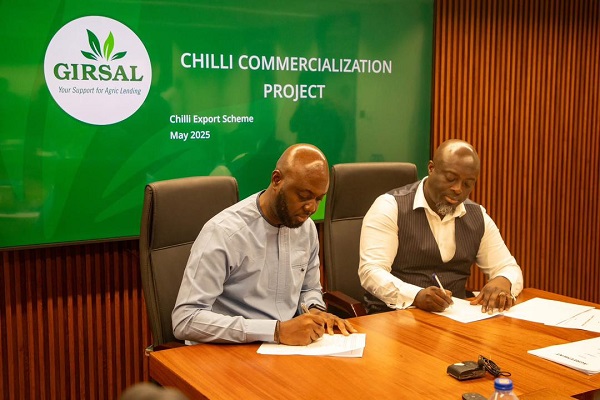
GIRSAL, agribusinesses sign MoU to revive Chili export to rake in $10m in revenue
Ghana’s effort to reclaim its lost position as a leading fresh chili exporter has been given a major boost with the signing of a Memorandum of Understanding (MoU) between the Ghana Incentive-Based Risk Sharing System for Agricultural Lending (GIRSAL) and 16 agribusiness to export the vegetable to the United States and European Union (EU) market.
The move is expected to rake in $3 million through the export of 600 metric tonnes of chili in the first year with a further projection of $10 million through the export of $2,000 metric tonnes over the next three years.
Making an average of $ 4.8m annual export value from Chili, Ghana was the leading fresh chili exporter to the United Kingdom (U.K) outside the EU until it was banned in 2015 due to the presence of quarantine pests. With the ban lifted in 2017, the country is struggling to regain its lost glory.
The MoU comes after GIRLSAL had successfully conducted a trial on four sites in the country through shade netting, a form of protected cropping structure that offers an ideal environment for plant growth, and protection from sunlight, wind, and pests.
The sites are located in Dawenya in the Greater Accra Region, Kyekyewere in the Eastern Region, Ziope, and Woadze — all in the Volta Region.
With the signing of the MoU, GIRSAL is expected to provide technical support, facilitate the acquisition of global certification, partial funding at lower interest rates for the agribusiness to enable them produce and export chili while facilitating access to markets for them.
The chili revitalisation project by GIRSAL is a private sector-led initiative aimed at enhancing the county’s chili production and export potential through protected cultivation.
Justification
The Chief Executive Officer of GIRSAL, Kwasi Duah, explained that the move aligns with his outfit’s five-year strategic vision to promote the development of high-potential agricultural value chains, enhancing Ghana’s export capacity, and increasing foreign exchange earnings.
In his justification, he said there was a growing demand for chili in established markets such as Europe, UK, with potential in USA and Middle East due to the growing population of Asia and African descendants as well as the popularity of ethnic cuisines that use fresh chili pepper.
In addition to this, he said the UK chili imports from outside the EU grew by 50 per cent between 2015 and 2020 with USA’s per capita consumption of fresh chili growing from 8 pounds to 11 pounds between 1999 and 2023, driven by imports.
He added that India, a major global competitor, was unable to meet its demand due to its weather between March and September.
As a result, he said Ghana would take advantage of this market window by leveraging on its past experience to take its share of the estimated untapped world market potential of $ 76m annually.
“What we are seeking to achieve with all this is to revitalise Ghana's chili production and exports and put us in the place where we were a few years ago. Not only would it increase the production, actually it will create a number of jobs for the teenage youth within our country, and also bring us a lot of foreign exchange in terms of the exports,” Mr Duah said.
Alignment
The Chief Operating Officer of GIRSAL, Samuel Yeboah, said the project aligned with the government accelerated Export Development Agenda adding, “We are going to work in partnership with the government agencies to ensure that we achieve this”.
The agribusiness, he said, were selected based on their willingness to commit to the project, the proximity of their farms to the airport among others.
Through GIRSAL’s intervention, he said the bank’s would finance 50 per cent of the total cost of production while the farmers would also bring some level of equity, adding that the rest will be financed from their internal generated funds.
“These farmers who are taking part in this project in the first place will have their capacities built. They will learn how to produce chilies under safe conditions more efficiently to be able to develop and scale up their productions to the highest level,” he added.